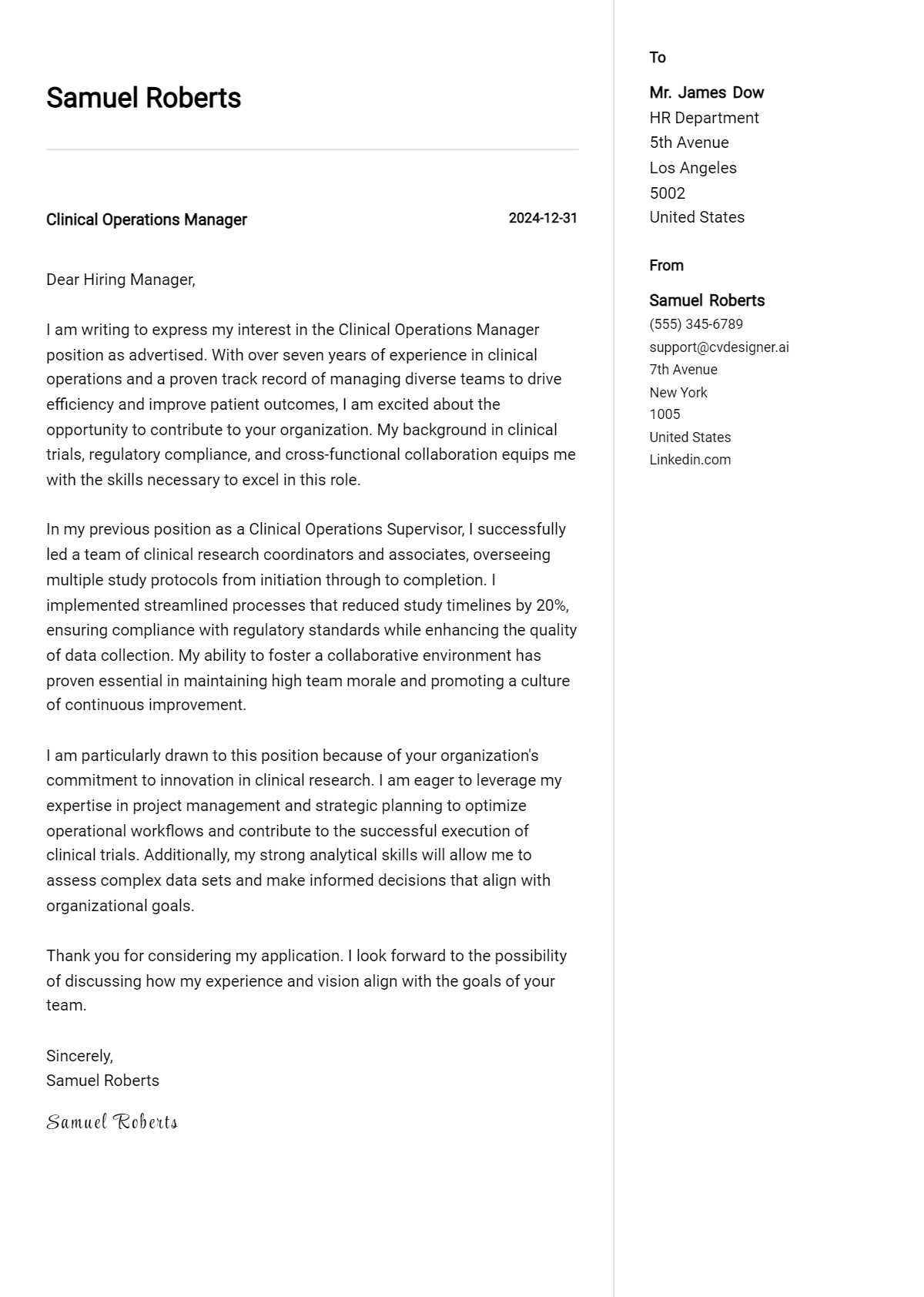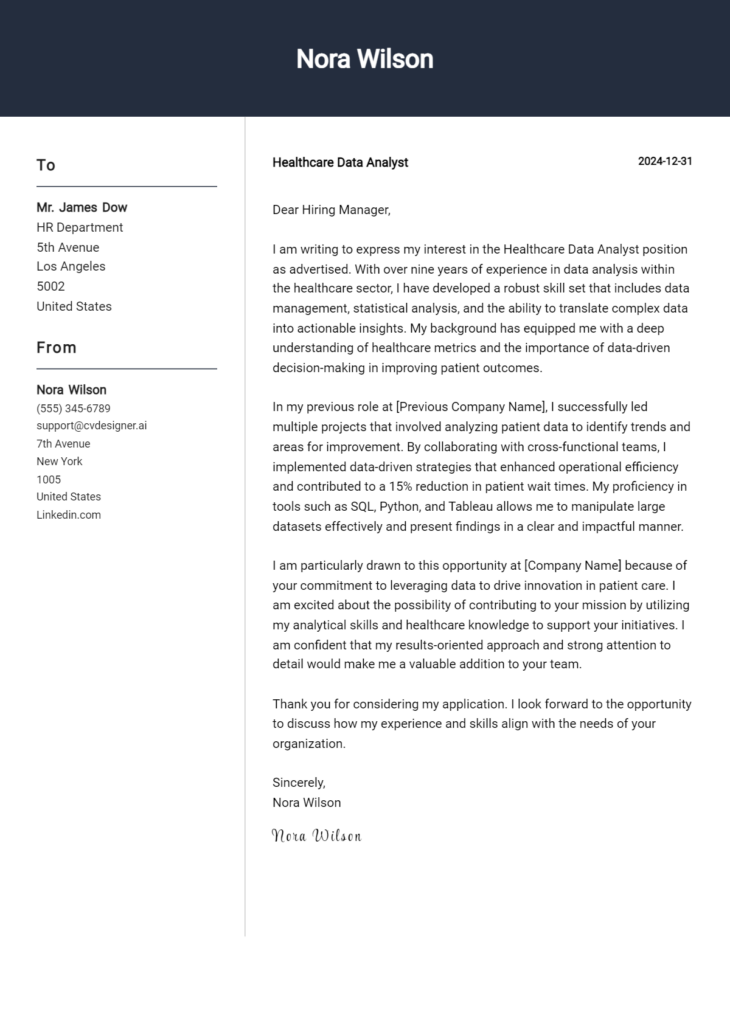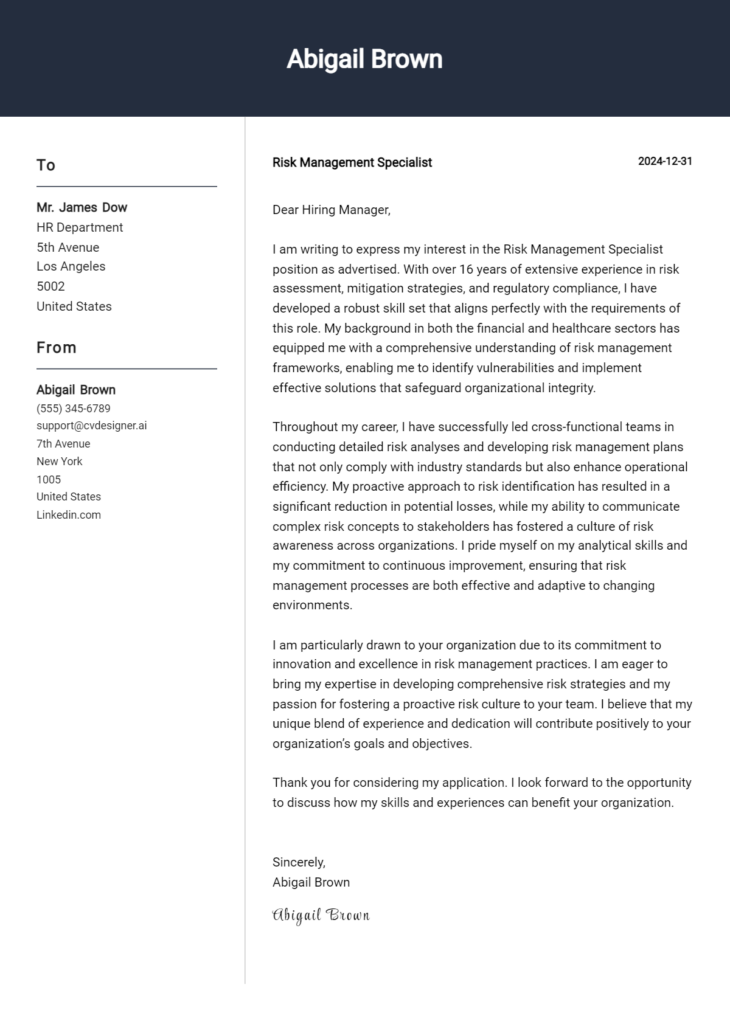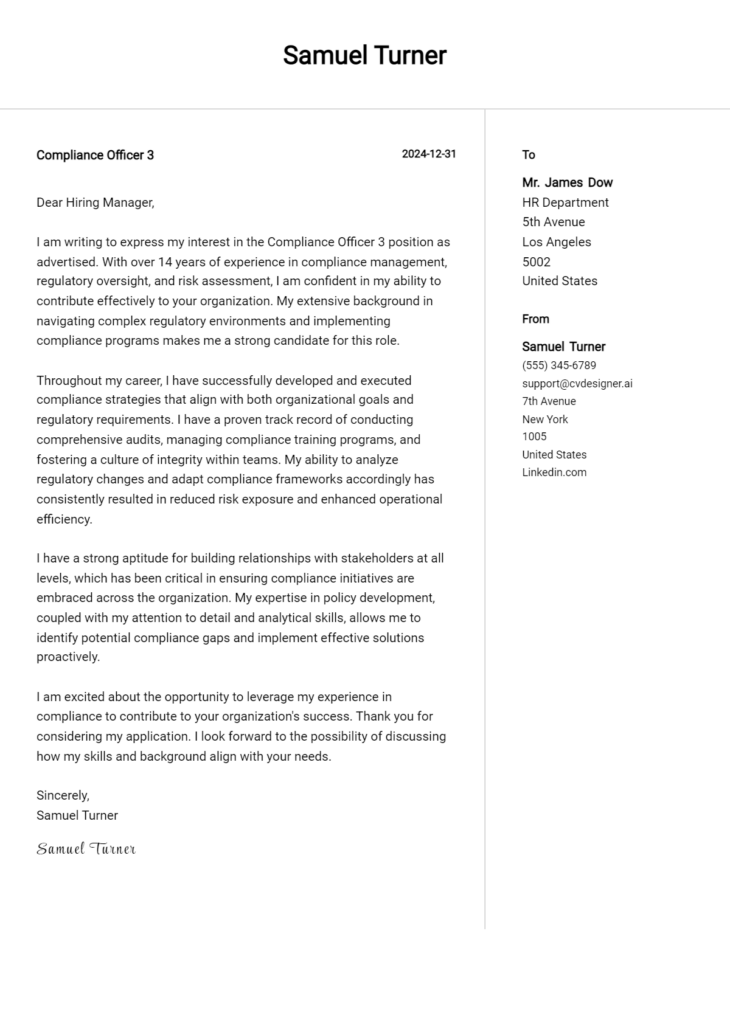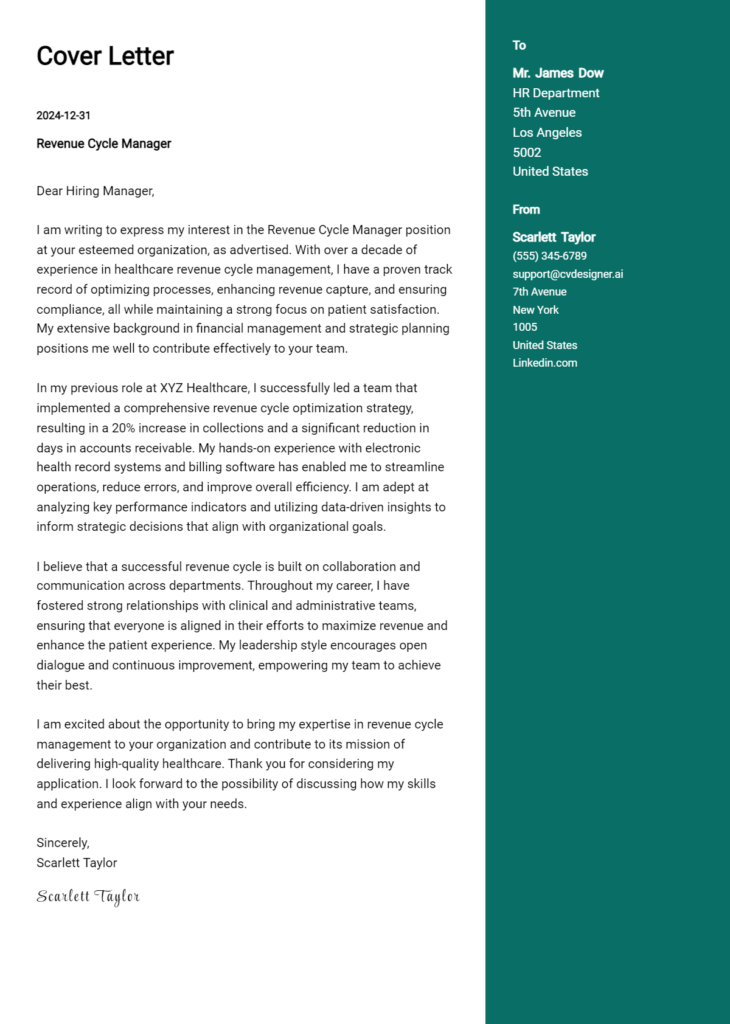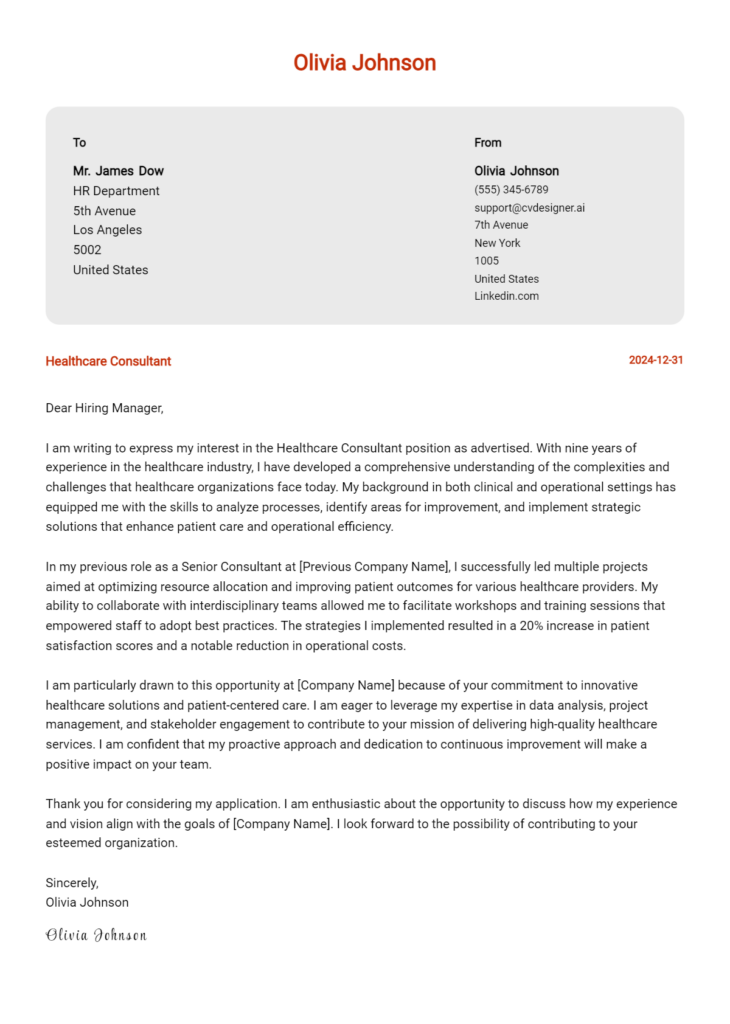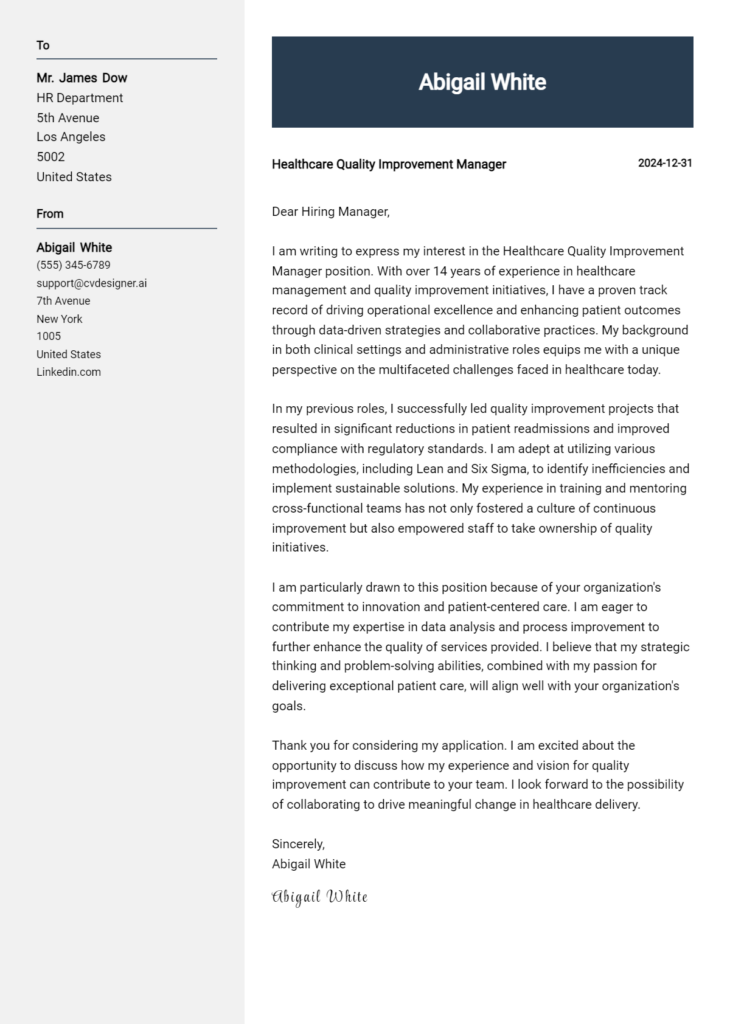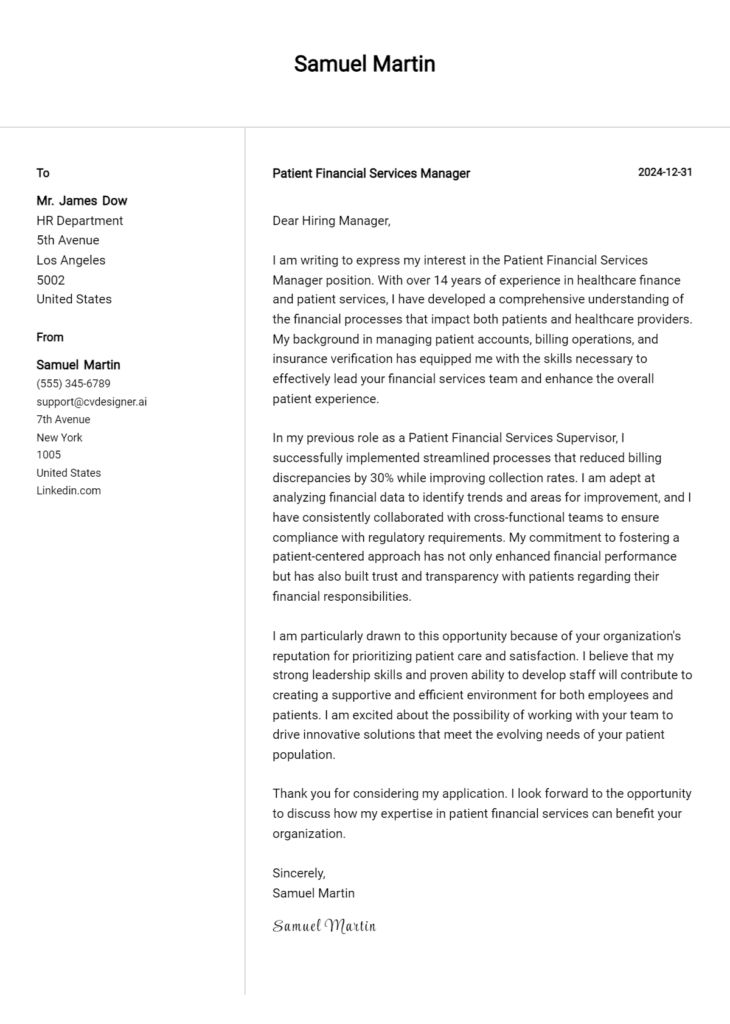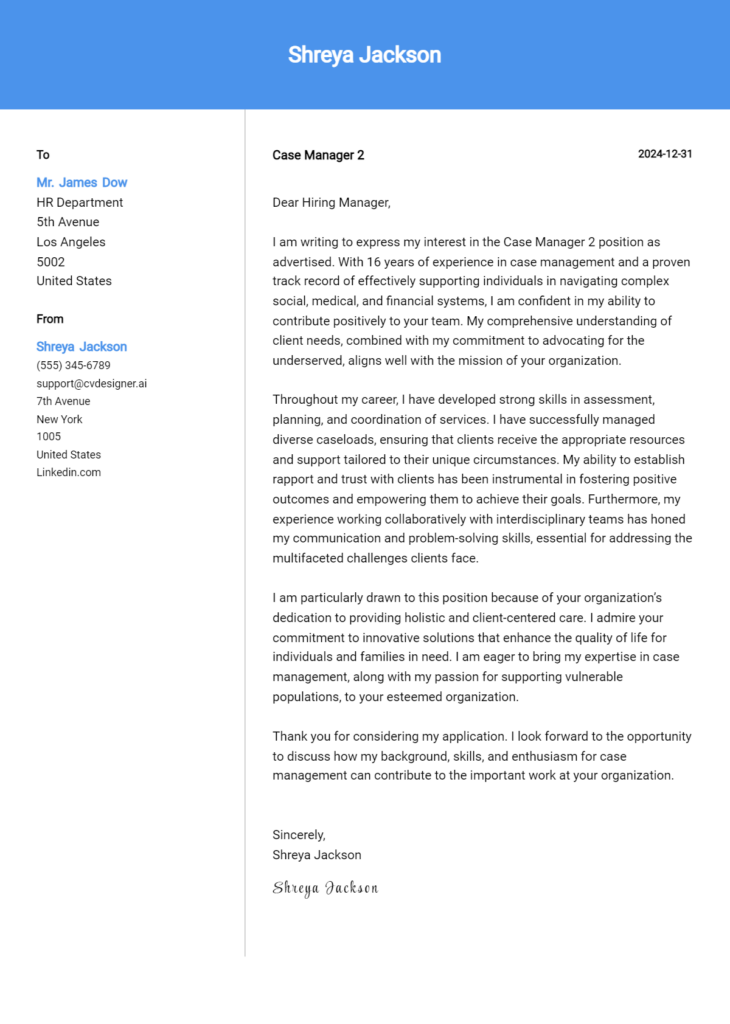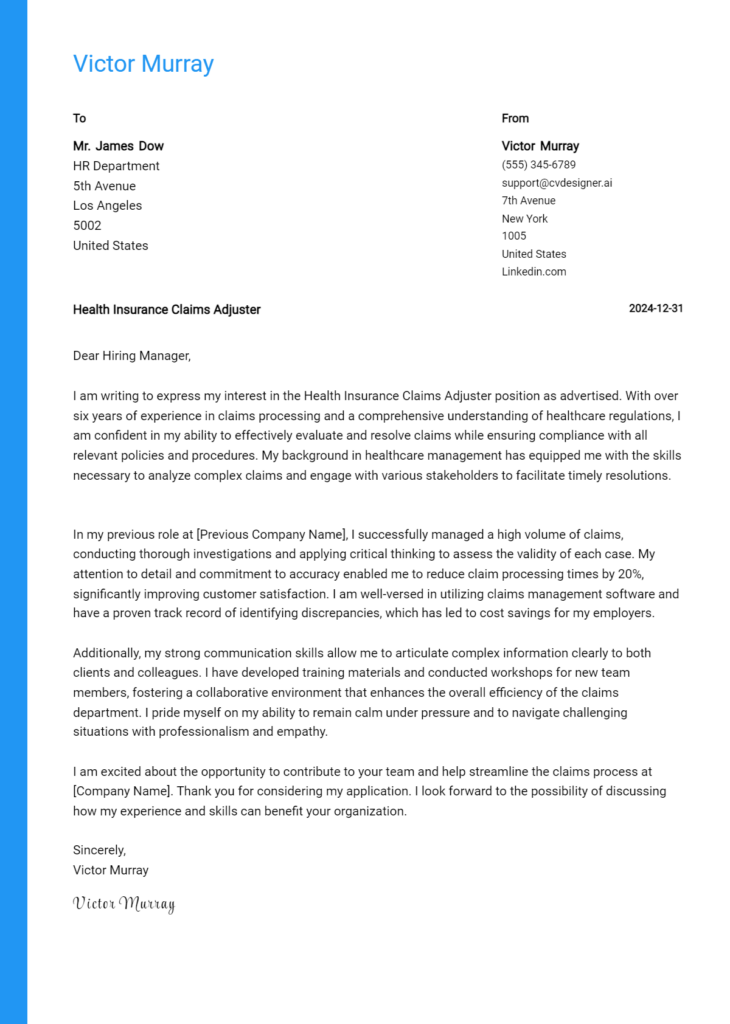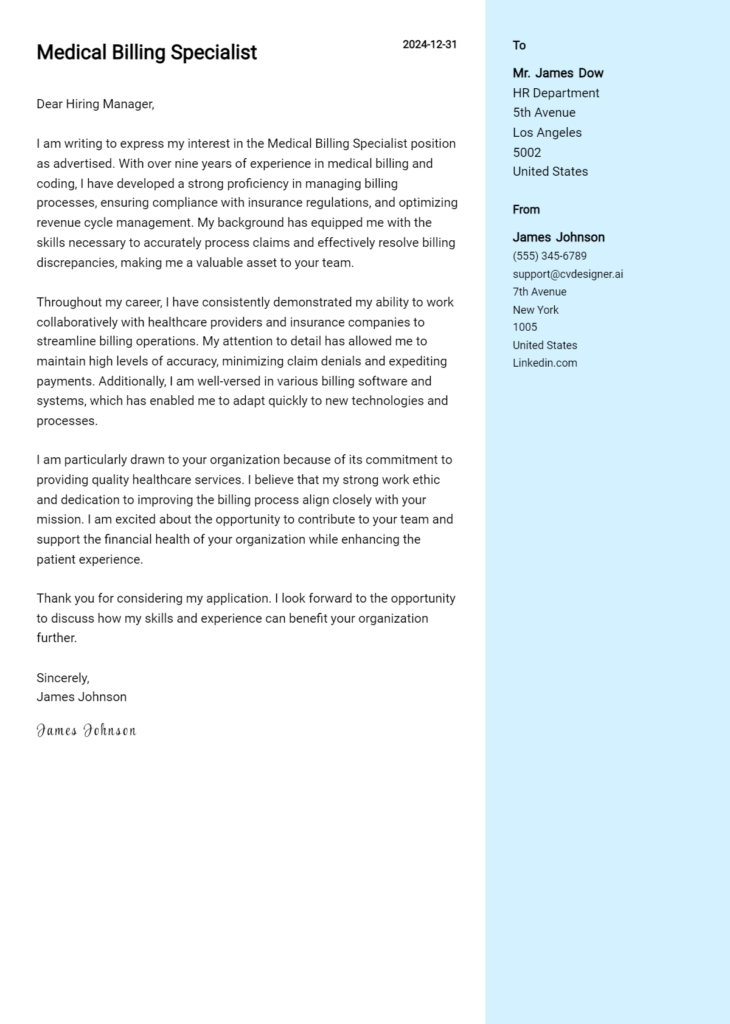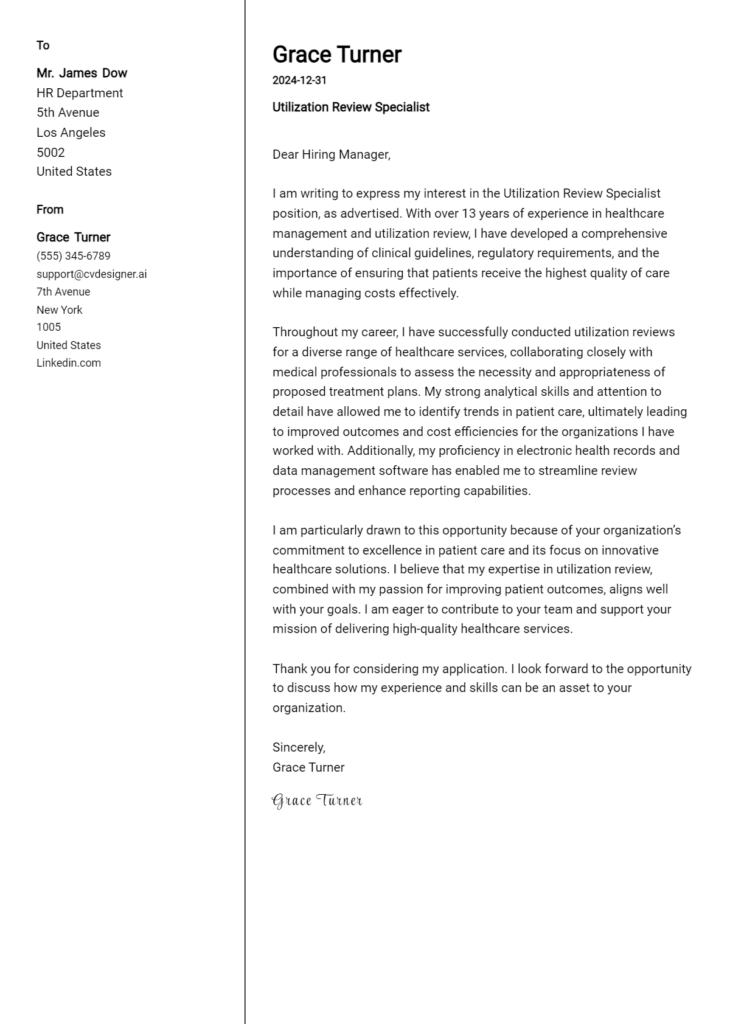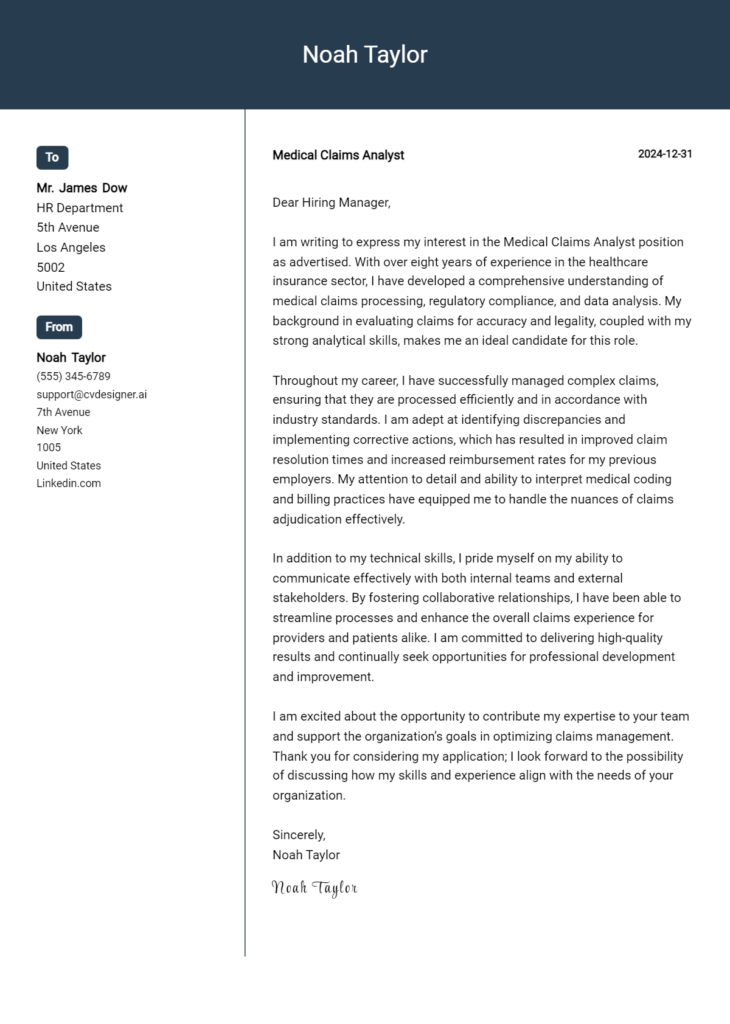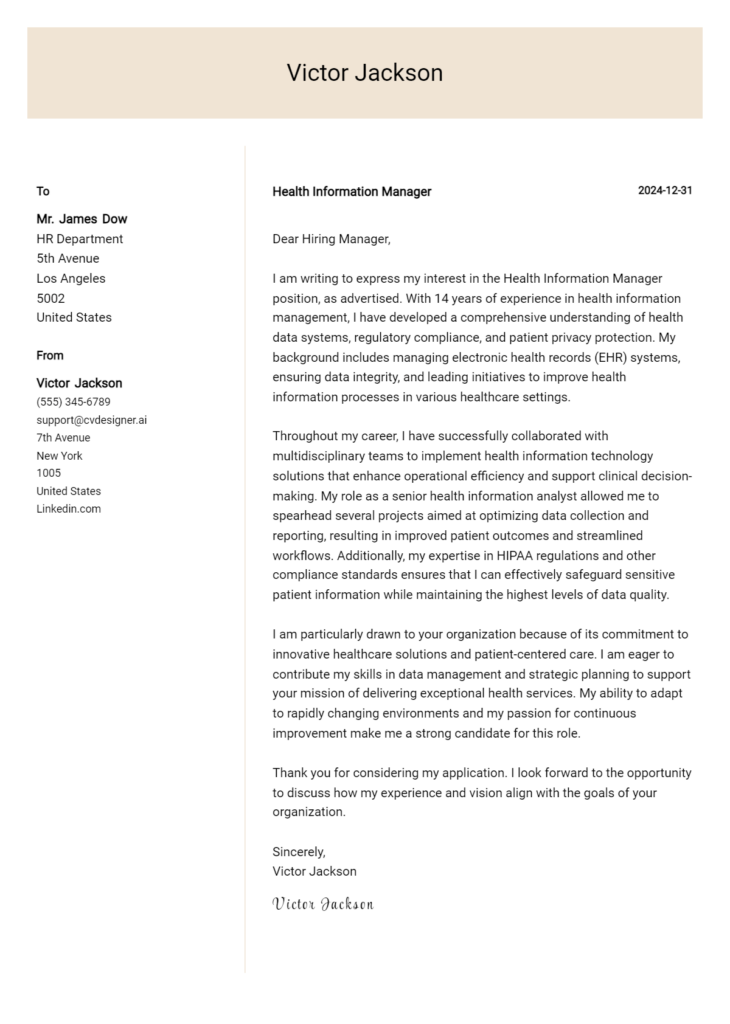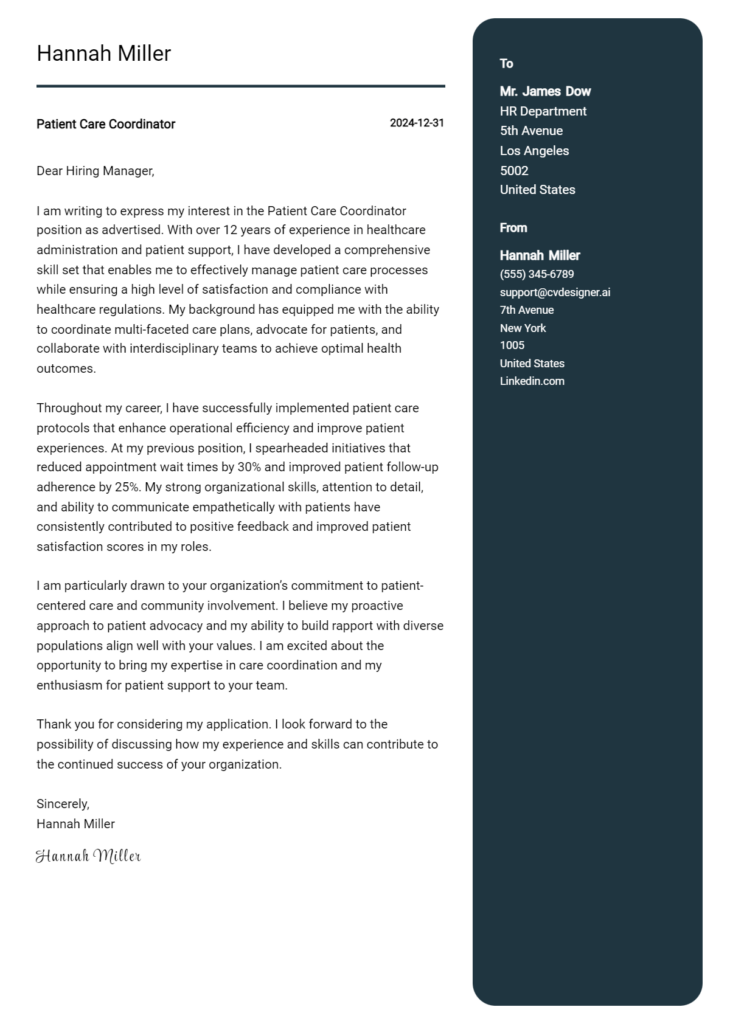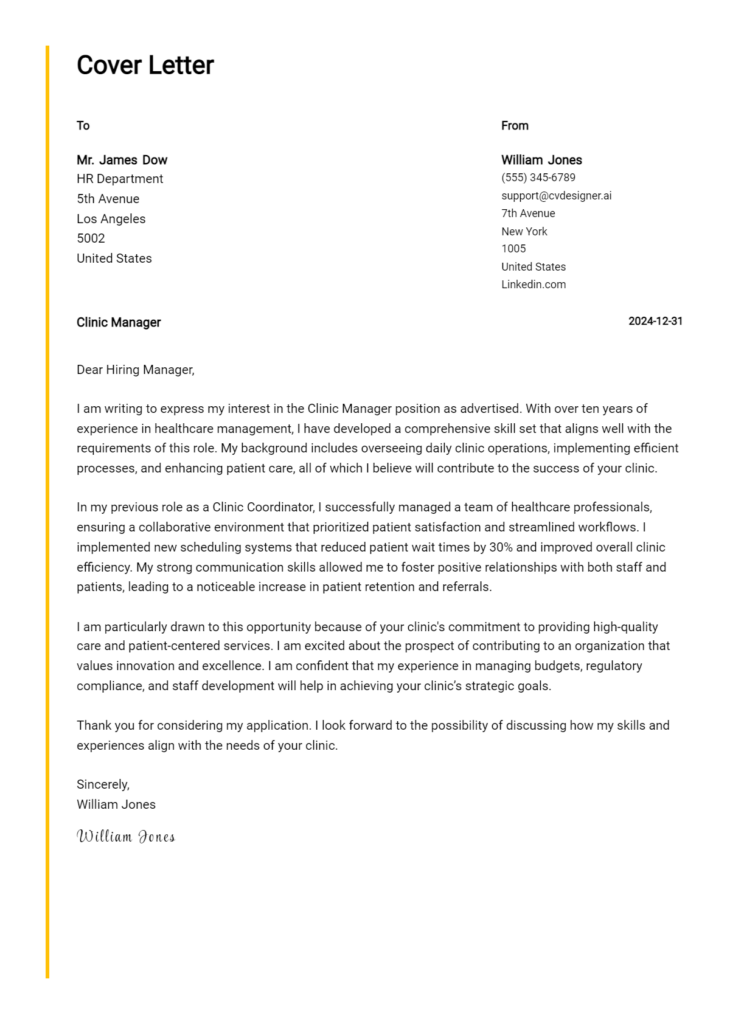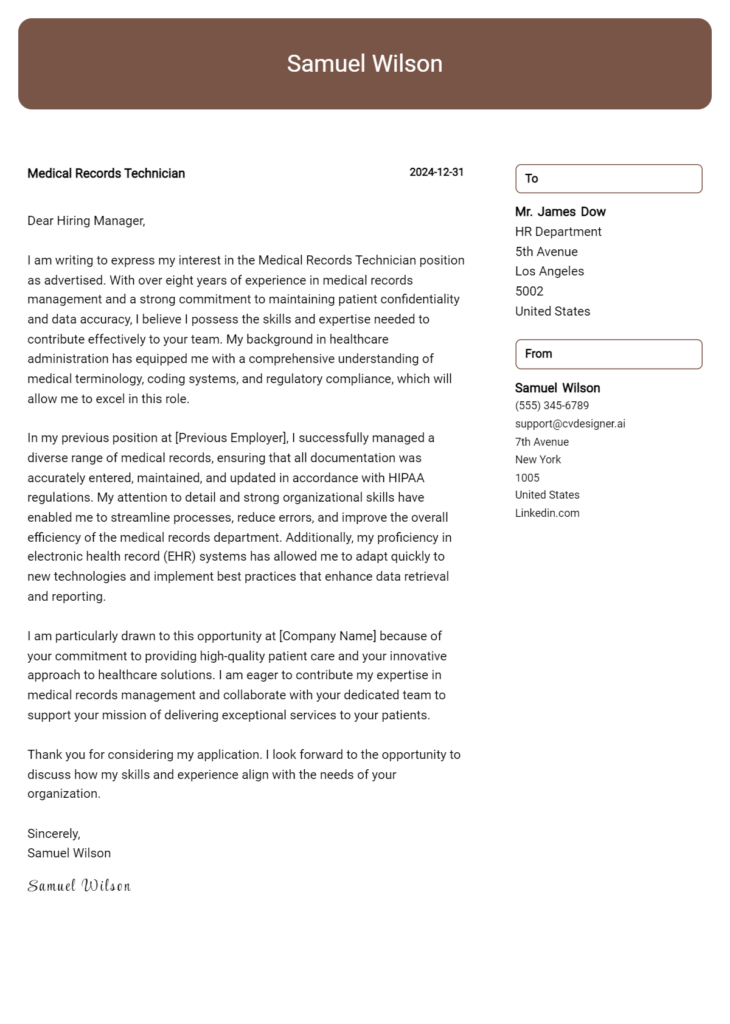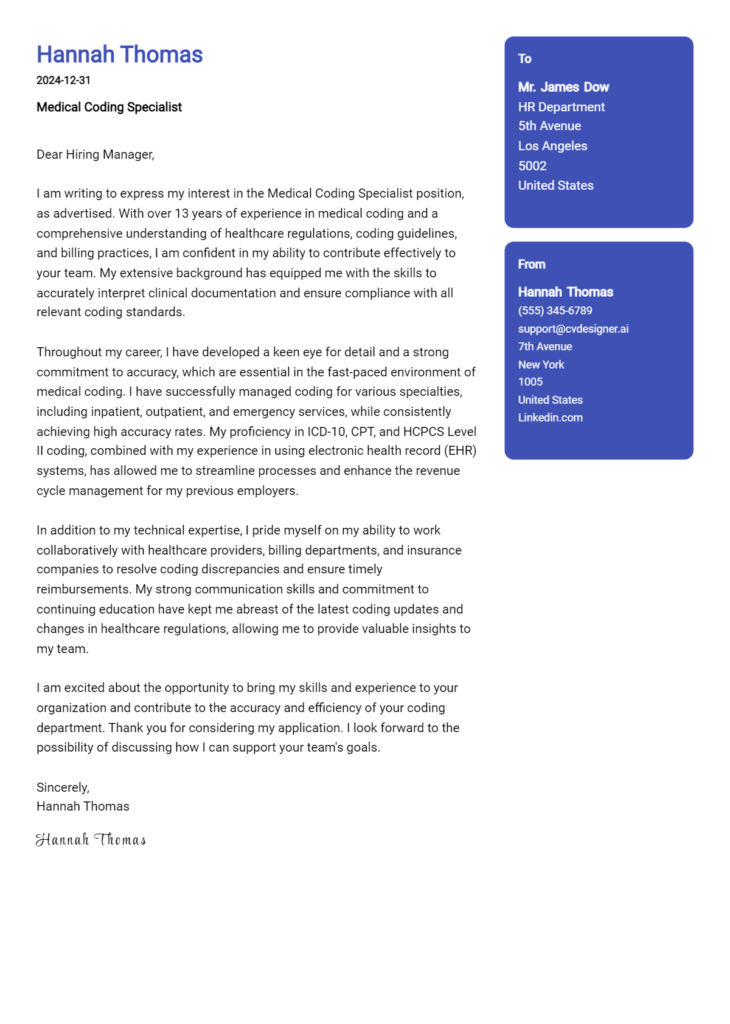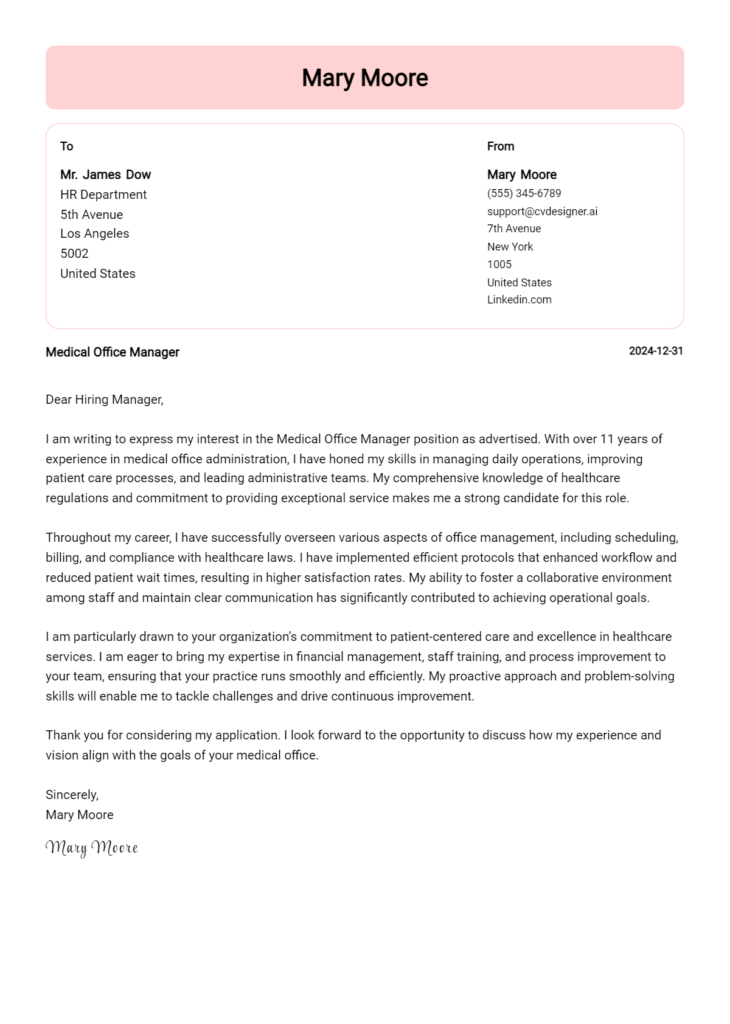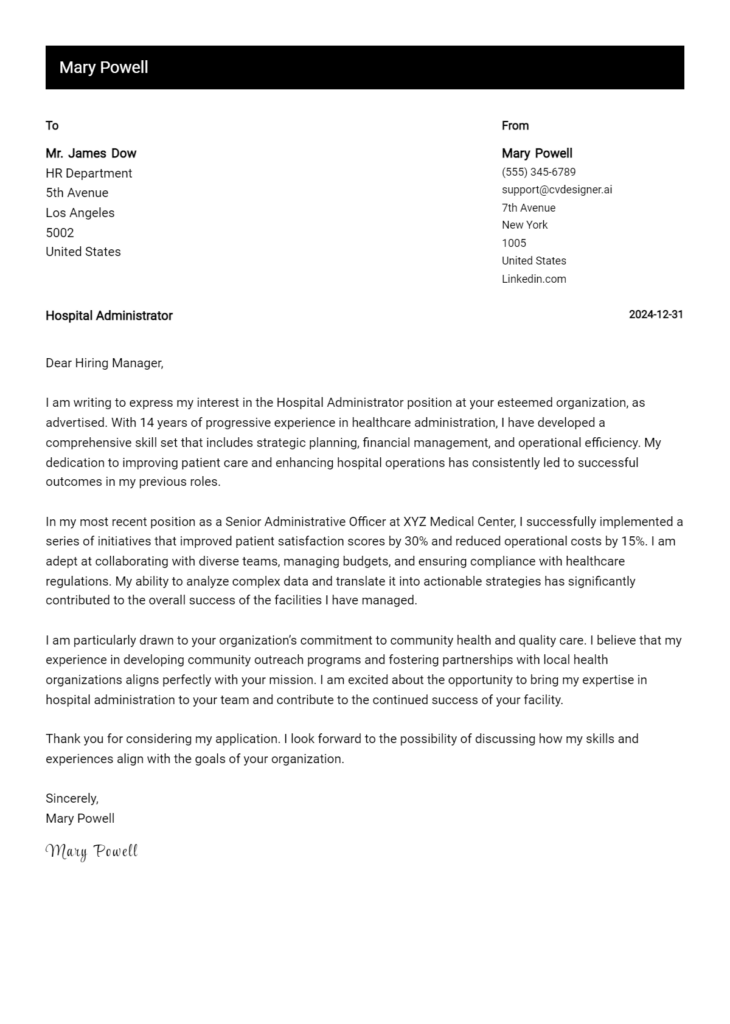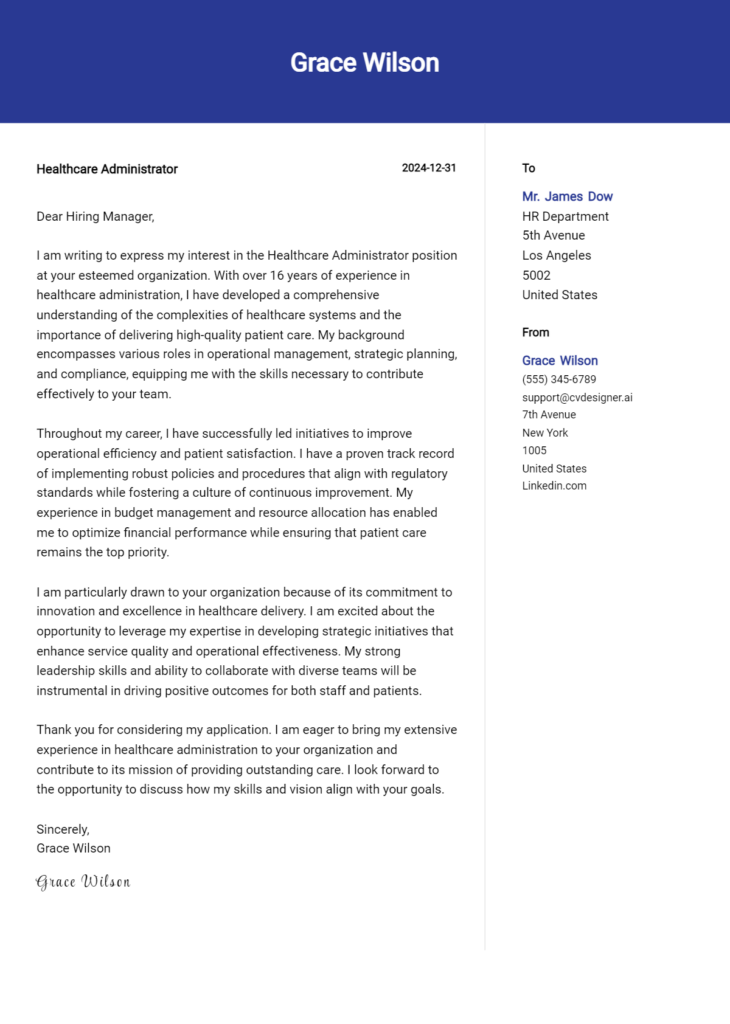Clinical Operations Manager Cover Letter Examples
Explore additional Clinical Operations Manager cover letter samples and guides and see what works for your level of experience or role.
How to Format a Clinical Operations Manager Cover Letter?
Crafting a compelling cover letter is essential for a Clinical Operations Manager as it serves as your first impression to potential employers. The format of your cover letter not only showcases your professionalism but also reflects your organizational skills and attention to detail—traits that are vital in clinical operations. A well-structured cover letter helps capture the hiring manager's interest, allowing you to effectively communicate your qualifications and passion for the role.
In this guide, we will outline how to structure your cover letter, providing insights and examples tailored for clinical operations management.
We will focus on the key components of a professional cover letter, including:
- Cover Letter Header
- Cover Letter Greeting
- Cover Letter Introduction
- Cover Letter Body
- Cover Letter Closing
Each section plays a crucial role in presenting your qualifications and reinforcing your suitability for the position. Let’s delve into each part to ensure your cover letter makes a lasting impact.
Importance of the Cover Letter Header for a Clinical Operations Manager
The header of a cover letter is crucial for establishing a professional tone and ensuring clarity from the very first glance. As a Clinical Operations Manager, your cover letter should reflect your attention to detail, organizational skills, and professionalism, which are key traits in the healthcare sector. The header should include your contact information, the date, and the recipient's details, formatted clearly and concisely. This sets the stage for the rest of your cover letter and conveys your seriousness about the position. A well-structured header can make a significant difference in making a strong first impression.
Strong Example:
John Doe 123 Healthcare Lane Cityville, ST 12345 (123) 456-7890 johndoe@email.com October 1, 2023 Jane Smith Hiring Manager Healthcare Innovations Inc. 456 Medical Road Cityville, ST 67890
Weak Example:
John D. 123 St. 10/01/2023 Hey there,
The Importance of the Cover Letter Greeting
The greeting of a cover letter plays a crucial role in setting the tone for the entire document. It serves as the first impression to the hiring manager and reflects your professionalism and attention to detail. By addressing the hiring manager directly, you demonstrate a personalized approach that shows you care about the position and the organization. Avoiding generic greetings like "To Whom It May Concern" is essential, as it can come across as impersonal and unenthusiastic. Instead, take the time to research the name of the recipient, which can often be found on the company's website or through LinkedIn. This effort not only enhances your credibility but also establishes a connection with the reader.
Strong Greeting Example
Dear Dr. Smith,
Weak Greeting Example
To Whom It May Concern,
The Importance of a Compelling Cover Letter Introduction for a Clinical Operations Manager
A well-crafted cover letter introduction is crucial for a Clinical Operations Manager, as it serves as the first impression to the hiring manager. This introduction should not only capture attention but also express genuine interest in the role while briefly highlighting relevant skills and accomplishments. A strong opening can set the tone for the rest of the cover letter, showcasing the candidate's qualifications and enthusiasm for the position. In contrast, a weak introduction can lead to a missed opportunity, failing to engage the reader or convey the candidate's suitability for the role. Here are examples of both strong and weak cover letter introductions:
Strong Example
Dear [Hiring Manager's Name], I am excited to apply for the Clinical Operations Manager position at [Company Name]. With over eight years of experience in clinical project management and a proven track record of optimizing operational processes, I am confident in my ability to contribute to your team. At [Previous Company], I successfully led a cross-functional team to reduce patient recruitment timelines by 30%, enhancing the overall efficiency of our clinical trials. I am eager to bring my expertise in strategic planning and regulatory compliance to [Company Name] to help drive innovative solutions in clinical operations.
Weak Example
To whom it may concern, I am applying for the Clinical Operations Manager position. I have some experience in the field and think I would be okay for the job. I have worked in various roles and have done some relevant tasks. I hope to hear back soon.
Cover Letter Body for Clinical Operations Manager
The body of a cover letter for a Clinical Operations Manager serves as a critical platform for candidates to articulate their unique skills, relevant experiences, and the value they can bring to the organization. This section should effectively highlight specific projects, accomplishments, or initiatives that demonstrate the candidate's expertise in clinical operations. By detailing impactful contributions, such as improving trial efficiency or leading successful regulatory submissions, the candidate can showcase their capacity to drive operational excellence and ensure compliance in a clinical setting. The body should reflect a blend of technical proficiency and leadership qualities, reinforcing the candidate’s alignment with the company's goals.
Strong Example
I successfully led a multi-site clinical trial that resulted in a 30% increase in patient recruitment within six months, significantly ahead of the projected timeline. By implementing a streamlined recruitment strategy and fostering collaboration among site staff, we not only met our enrollment goals but also maintained protocol adherence, which contributed to the integrity of our data. Additionally, I played a key role in preparing for FDA audits, achieving a 100% compliance rate, which enhanced our reputation with stakeholders and paved the way for subsequent funding opportunities.
Weak Example
I have worked on several clinical trials in the past. My job was to help with patient recruitment and ensure that things were done correctly. I think I did a good job, and I hope to continue doing this type of work in the future.
Importance of the Cover Letter Closing for a Clinical Operations Manager
The closing paragraph of a cover letter is crucial as it serves to summarize your qualifications, express your enthusiasm for the Clinical Operations Manager position, and encourage the hiring manager to take the next steps, such as reviewing your resume or scheduling an interview. A strong closing leaves a lasting impression, reinforces your fit for the role, and demonstrates your proactive attitude. Conversely, a weak closing may come across as unenthusiastic or vague, potentially undermining your candidacy.
Strong Example
Thank you for considering my application for the Clinical Operations Manager position. With my extensive experience in clinical trial management, a proven track record of optimizing operational efficiency, and a genuine passion for improving patient outcomes, I am excited about the opportunity to contribute to your team. I look forward to discussing how my skills align with your needs and hope to schedule an interview at your earliest convenience. Please find my resume attached for your review.
Weak Example
I appreciate your time in looking at my application. I think I could do a decent job as a Clinical Operations Manager. If you want to look at my resume, it’s included. Let me know if you want to talk.
These tips are designed to help candidates create a compelling cover letter for the role of Clinical Operations Manager. A well-crafted cover letter not only highlights your relevant experience but also emphasizes your technical skills, problem-solving abilities, knowledge of the Software Development Life Cycle (SDLC), teamwork capabilities, and dedication to continuous learning. By effectively showcasing these attributes, you can stand out in a competitive job market.
Tips for Crafting an Effective Cover Letter for Clinical Operations Manager
Highlight Technical Skills: Clearly outline your technical competencies related to clinical operations, such as knowledge of clinical trial protocols, regulatory compliance, and data management systems. Use specific examples to demonstrate how these skills have contributed to successful project outcomes.
Showcase Problem-Solving Abilities: Employers value candidates who can think critically and solve complex issues. Discuss a time when you faced a significant challenge in a clinical project and explain the steps you took to resolve it. This not only illustrates your problem-solving skills but also your ability to remain calm under pressure.
Demonstrate SDLC Knowledge: Understanding the Software Development Life Cycle is crucial for a Clinical Operations Manager, especially when dealing with clinical applications. Mention any relevant experience you have with SDLC phases, including planning, development, testing, and deployment, to showcase your comprehensive knowledge in this area.
Emphasize Teamwork: Collaboration is key in clinical operations. Provide examples of how you have worked effectively within multidisciplinary teams, highlighting your role in fostering communication and cooperation among team members. This will demonstrate your ability to lead and contribute positively to team dynamics.
Express a Passion for Continuous Learning: The clinical field is always evolving. Convey your commitment to staying updated with industry trends, attending workshops, or pursuing additional certifications. This not only shows your dedication to personal growth but also reassures employers of your proactive approach to professional development.
For additional assistance, consider using cover letter templates or a cover letter builder to streamline your writing process and create a polished final product.
Common Mistakes to Avoid in a Clinical Operations Manager Cover Letter
Avoiding common mistakes in your cover letter is crucial for securing an interview as a Clinical Operations Manager. A well-crafted cover letter can set you apart from other candidates, while simple errors can undermine your professionalism. Here are some common pitfalls to watch out for:
- Generic Greetings: Avoid using "To Whom It May Concern." Instead, research the hiring manager's name for a personalized touch.
- Lack of Specificity: Failing to mention specific skills or experiences can make your letter forgettable. Tailor your content to highlight relevant achievements in clinical operations.
- Overly Long Letters: Keep your cover letter concise; ideally, one page. Focus on your most pertinent qualifications to maintain the reader's attention.
- Neglecting Formatting: A poorly formatted cover letter can detract from your professionalism. Follow a clear cover letter format to ensure readability.
- Typos and Grammatical Errors: Proofread your letter multiple times. Errors can signal a lack of attention to detail, which is critical in clinical operations.
- Using Jargon Excessively: While it's important to showcase your industry knowledge, avoid overloading your letter with jargon that could confuse readers.
- Failing to Demonstrate Passion: Show enthusiasm for the role and organization. A lack of passion can be off-putting to potential employers.
For inspiration, consider checking out some cover letter examples that effectively highlight relevant skills and experiences without falling into these traps.
Cover Letter FAQs for Clinical Operations Manager
What should I include in my cover letter for a Clinical Operations Manager position?
In your cover letter, focus on highlighting your relevant experiences and achievements in clinical operations. Start with a strong introduction that grabs attention, followed by specific examples of your leadership in managing clinical trials, ensuring compliance with regulatory standards, and optimizing operational processes. Mention any experience with cross-functional teams and your ability to support the development of clinical strategies. Additionally, emphasize your skills in project management, budget oversight, and quality assurance. Tailor your content to reflect the key requirements outlined in the job description, demonstrating your understanding of the role and how your background aligns with their needs.
How do I showcase my leadership skills in my cover letter?
To effectively showcase your leadership skills in a cover letter for a Clinical Operations Manager role, provide concrete examples of past experiences where you led teams or projects. Discuss situations where you successfully managed clinical trials or initiatives, highlighting your decision-making capabilities and how you motivated your team to achieve goals. Use quantifiable metrics when possible, such as improving trial timelines by a certain percentage or reducing costs through strategic planning. Also, mention your ability to foster collaboration among cross-functional teams, ensuring that everyone is aligned with the project's objectives, which is crucial in clinical operations.
Should I include technical skills in my cover letter?
Yes, including technical skills in your cover letter is essential for a Clinical Operations Manager position. Highlight skills relevant to the role, such as proficiency in clinical trial management systems, data analysis tools, and regulatory compliance software. Mention your understanding of Good Clinical Practice (GCP) and other regulatory frameworks, as well as any experience with electronic data capture (EDC) systems. Additionally, if you have experience in managing budgets or utilizing project management software, be sure to include that. Demonstrating your technical expertise not only shows your qualifications but also indicates your readiness to tackle the demands of the position effectively.
How can I make my cover letter stand out among other applicants?
To make your cover letter stand out, personalize it for the specific organization and role. Research the company’s mission, values, and recent projects, and mention how your personal values align with theirs. Use a compelling opening statement to capture the reader's attention, and maintain a professional yet engaging tone throughout. Incorporate storytelling by sharing a brief anecdote that illustrates your passion for clinical operations and your impact in previous roles. Finally, showcase your enthusiasm for the position by expressing your eagerness to contribute to their team's success, which can leave a lasting impression on hiring managers.
Build your Cover Letter in minutes
Use an AI-powered cover letter builder and have your letter done in 5 minutes. Just select your template and our software will guide you through the process.

